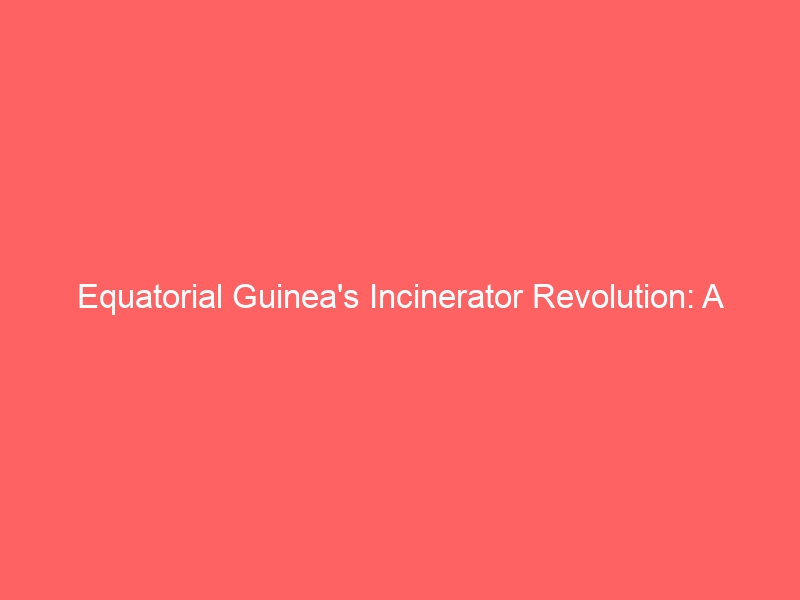Equatorial Guinea is a small country located on the western coast of Central Africa. Over the years, the country has faced numerous environmental challenges, particularly when it comes to waste management. With limited resources and infrastructure, the country has struggled to find effective and sustainable solutions for handling its growing waste problem. However, in recent years, Equatorial Guinea has taken a major step towards a greener future with the implementation of an incinerator revolution.
The incinerator revolution in Equatorial Guinea is a significant development that aims to address the country’s waste management issues and move towards a more sustainable and environmentally friendly approach. By investing in modern incineration technology, the country is able to safely dispose of its waste while also generating energy in the process. This innovative solution not only helps to reduce the environmental impact of waste disposal but also contributes to the country’s energy needs.
The introduction of incinerators in Equatorial Guinea represents a major shift in the country’s approach to waste management. With the ability to safely and efficiently dispose of various types of waste, including organic, medical, and hazardous waste, incinerators offer a versatile and effective solution for addressing the country’s waste management challenges. The incinerator revolution is not only beneficial for the environment but also for the overall public health and well-being of the population.
One of the main objectives of the incinerator revolution in Equatorial Guinea is to reduce the amount of waste that ends up in landfills. Landfill sites are not only unsightly and polluting, but they also pose a significant risk to the environment and public health. By investing in incineration technology, Equatorial Guinea is able to minimize the reliance on traditional landfill sites and instead focus on a more sustainable and efficient approach to waste management.
In addition to reducing the amount of waste in landfills, the incinerator revolution in Equatorial Guinea also has the potential to generate energy from waste. Modern incineration technology allows for the recovery of heat and energy during the waste disposal process. This energy can be used to power facilities, provide heat for industrial processes, or even generate electricity for the local community. By harnessing the energy from waste, Equatorial Guinea can reduce its reliance on traditional energy sources and move towards a more sustainable and renewable energy future.
Furthermore, the introduction of incinerators in Equatorial Guinea has the potential to create new opportunities for waste management and recycling initiatives. By implementing a comprehensive waste management strategy that includes incineration technology, the country can explore new avenues for recycling and reusing materials that would otherwise end up in a landfill. This not only reduces the environmental impact of waste disposal but also supports the development of a more circular economy in Equatorial Guinea.
Overall, Equatorial Guinea’s incinerator revolution represents a major step towards a greener and more sustainable future for the country. By investing in modern incineration technology, the country is able to address its waste management challenges while also contributing to energy generation and environmental protection. This innovative approach to waste management has the potential to improve public health, reduce environmental pollution, and create new opportunities for sustainable development in Equatorial Guinea.
FAQs:
Q: What is an incinerator?
A: An incinerator is a facility or device used to safely and efficiently dispose of waste by burning it at high temperatures. Modern incinerators are equipped with advanced technology to minimize the environmental impact of waste disposal and can also generate energy during the process.
Q: How does incineration help the environment?
A: Incineration helps the environment by reducing the amount of waste that ends up in landfills, minimizing pollution and greenhouse gas emissions, and generating energy from waste that would otherwise be wasted.
Q: Are incinerators safe for public health?
A: Modern incinerators are designed to meet strict environmental and safety standards to ensure that they operate safely and effectively. When operated properly, incinerators can help to reduce the spread of disease and minimize the risk of contamination from hazardous waste.
Q: How can incineration contribute to energy generation?
A: Incineration technology allows for the recovery of heat and energy from the burning of waste. This energy can be used to power facilities, provide heat for industrial processes, or generate electricity for the local community.
Equatorial Guinea’s Incinerator Revolution: A Step Towards a Greener Future




